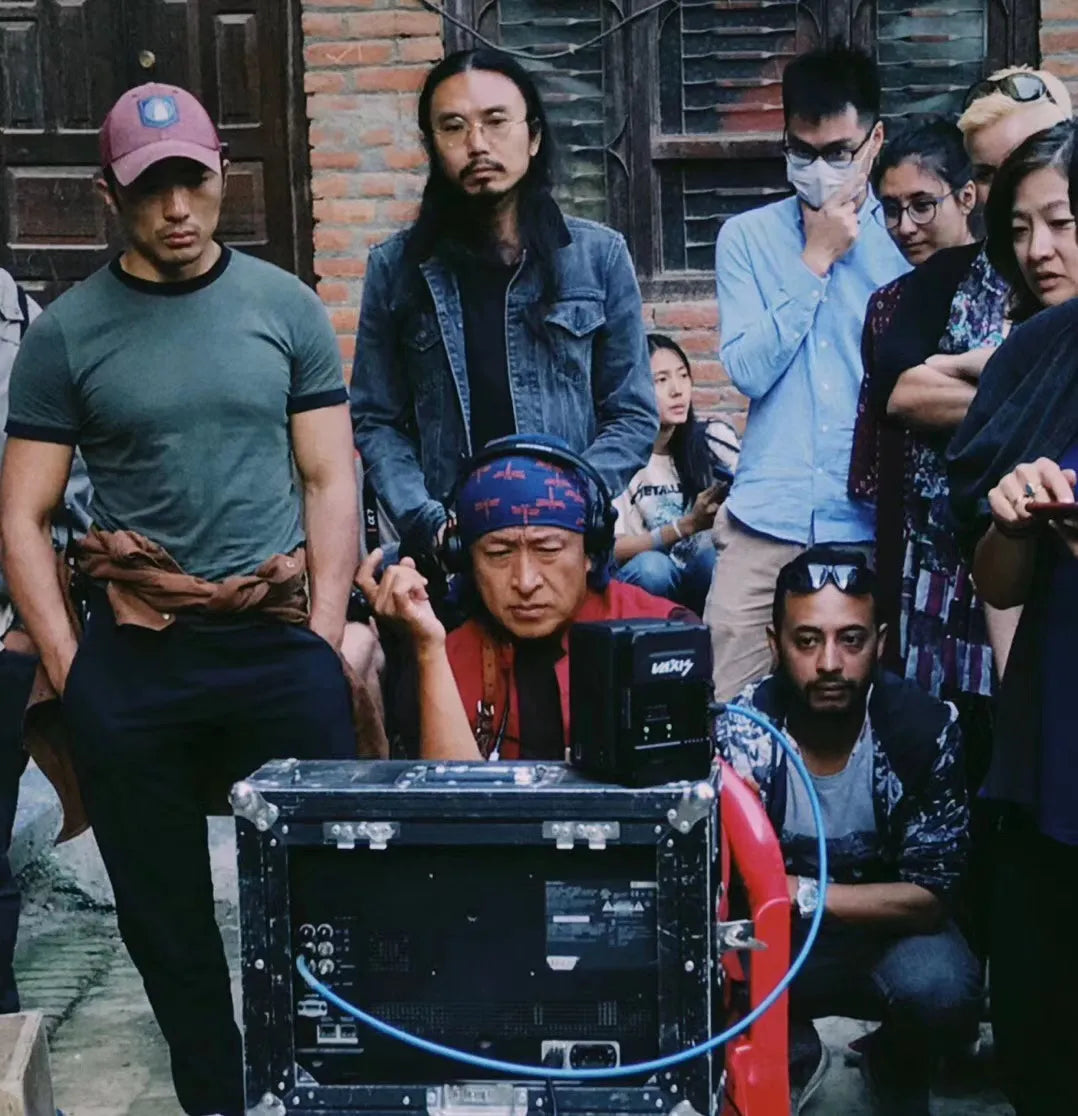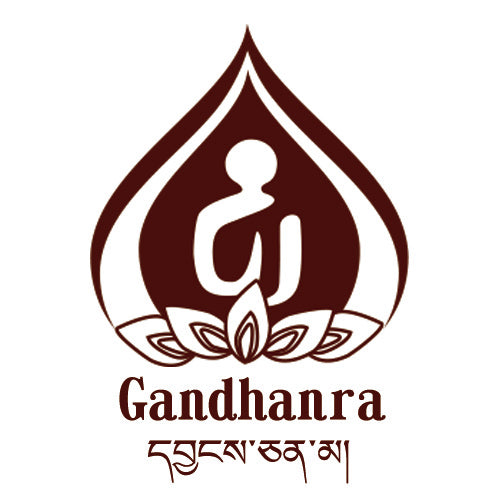
The first Lama director Khyentse Norbu ▎films are contemporary thangka art.

A lama director who can tell stories
Known as the world's first "lama director", Khyentse Norbu served as a consultant for Bernardo Bertolucci's film "Little Buddha" and in 1999, he directed his first film "The World Cup on the Mountain" which received critical acclaim. To date, he has directed five films.

Khyentse Norbu believes that movies are a tool, a medium, a language, a means of communication. They can be used to enhance practice, as well as benefit others who are interested in spiritual practice. As long as one's motivation is pure, movies can help others. In the history of Buddhism, the use of visual arts has never been suppressed, but rather encouraged, such as various sculptures and paintings.

"Although I studied film in London before, it wasn't until I watched Vittorio's 'Bicycle Thieves' that I started to think about making my own films. The director of 'The Little Buddha', Bertolucci, provided me with a lot of inspiration, especially his poetic and visually striking presentation of the true face of humanity, which deeply resonated with me.
For me, film can be very spiritual, it is a language, a way to communicate with people."
Introduction to the five-film collection of Khyentse Norbu
World Cup on the High Mountains (1999)

"The World Cup on the High Mountains" is adapted from a true story and filmed by monks acting as actors in the temple. The film tells the story of a young monk living in the deep mountains of India during the 1998 World Cup in France, who is obsessed with watching the World Cup. Faced with the strict discipline of the temple, the young monk's passion for football only highlights people's "obsession" with a certain thing.

The director presents the conflict between secular life and the life of monks in a humorous and witty narrative style, aiming to show viewers the suffering brought by "ignorance" and "attachment". In order to rent a TV to watch the World Cup in the monastery, the young lama, feeling guilty, let the Tibetan Nima pawn the pocket watch left by his mother to an Indian merchant. While watching the World Cup, the indescribable sadness in Nima's heart awakens the lama's guilt and anxiety, prompting him to rekindle his compassion. Through the art of the film, Khyentse Norbu interprets human nature and guides beings to awaken from their attachments.
Khyentse Norbu once said, "Although some people think that 'The World Cup on the High Mountain' is a Buddhist film, personally I believe this film is more about the story of human obsession and growth."
Travellers and Magicians (2003)


Vara: A Blessing (2013)

Khyentse Norbu's third feature film "VARA: Blessing" is titled in Sanskrit, meaning gift or protection. This film is different from his previous two films, as "VARA: Blessing" has an Indian theme.
Based on the novel "Blood and Tears" by renowned Indian poet and novelist Sunil Gangopadhyay, the film stars Imran Khan, Shahid Kapoor, Shahana Goswami, Mamatha Bhukya, and Padmapriya Janakiraman.

Stylistically, the film is filled with vibrant energy thanks to stunning cinematography and colorful visuals, with award-winning cinematographer Bradford Young's striking visual effects and the musical score composed by Indo-British musician Nitin Sawhney seamlessly blended into the film.

The film deals with complex issues such as caste system and the Purohito dance (a highly mystical, profound, vast, and infinite spiritual dance). Because Rinpoche has always been a fan of Purohito dance and Carnatic music (an Indian music tradition originating from the ancient Sama Vedas) as well as the love of Jaya Deva's "Gita Govinda", this film is indeed a challenge for the director.
"Because it is made in local languages, the film may become boring and commercially fail. However, I am very nervous because it is different, with actors from Bollywood and some independent actors. All of this makes me extremely nervous, I can no longer use 'Rinpoche's dictatorship'." Director Khyentse Norbu laughed.
Hema Hema: Sing Me a Song While I Wait (2016)

In 2016, director Chin Tse-Nup's fourth feature film "Hey Ma Hey Ma" was inspired by modern social networking. To film this movie, Khyentse Norbu specifically immersed himself in the virtual world of online social networking.
"Hey Ma Hey Ma" means "a long time ago" in Dzongkha. The story takes place in a forest at the foot of the Himalayas, where a secret ritual is held every twelve years. Selected individuals wear masks and leave behind their worldly identities to embark on a two-week secluded and surreal experience. During this time, they explore the boundaries between reality and illusion, with those harboring desires finding themselves tempted beneath the masks.

Khyentse Norbu said in an interview: "This film tells about 'cause and effect', where one action always leads to another result, like a volcanic eruption. The man in the film, wearing a mask, begins to feel tortured after doing certain things, and one mistake will trigger a series of karmic consequences."
The film invited well-known Chinese actors Zhou Xun and Tony Leung to star without pay. It has also received high praise from the fourth-generation director Xie Fei: "I have long heard of this 'lama director' who is the best storyteller in the world. The Tibetan culture that I love is portrayed so uniquely by him, and the rich philosophical thoughts of Buddhism are creatively incorporated into the audiovisuals. The fusion of national music, dance, rituals, Buddhist spirituality, modern society, virtual world, and real human nature, all demonstrate the director's extraordinary intelligence."
Looking for a Lady with Fangs and Moustache (2019)

The fifth film by director Khyentse Norbu tells the story of a Tibetan entrepreneurial youth named Danzeng, who is determined to open the best coffee shop in Nepal. Just as he wholeheartedly pursues his dream, Danzeng is suddenly plagued by recurring, eerie nightmares and hallucinations. His friends and prophets warn him that these are omens of impending death, and advice from spiritual guides and ancient texts suggest that only by finding a "special woman" called the Dakini can he save his life. Thus, Danzeng embarks on a journey to find this "unique female," facing a direct confrontation with his own paranoia and fears.
The film explores the tension between modern civilization and traditional beliefs, and features cinematography by Li Pingbin, the cinematographer of "In the Mood for Love," whose dreamlike cinematography adds to the mystery of the film.

Khyentse Norbu said: "In an increasingly mechanized and automated world, a world on the verge of creating artificial intelligence, and a world where superstition is opposed, I am trying to explore the last remnants of Tibetan mysticism in this film because it closely integrates the modern world with the ancient world.
However, I believe that this ancient wisdom, reflecting the Buddhist view of reality, is of great significance to our modern world. In this tumultuous era, the respect for female energy is absolutely crucial, so I intend to use this film to express some ways traditionally used to summon energy."

Khyentse Norbu's films contain amazing energy and rich humanistic spirit, like a clear stream, consistently winning praise and awards at major film festivals around the world. He once believed that "film can be regarded as a modern Thangka art." In the future, Khyentse Norbu has always hoped to film a movie about Buddha, and we look forward to this great art being presented to the public as soon as possible.

